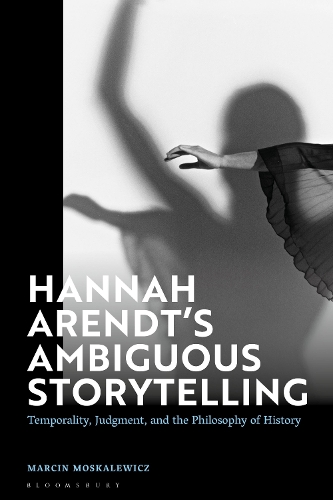
Hannah Arendts Ambiguous Storytelling: Temporality, Judgment, and the Philosophy of History
(Paperback)
Available Formats
Publishing Details
Hannah Arendts Ambiguous Storytelling: Temporality, Judgment, and the Philosophy of History
By (Author) Marcin Moskalewicz
Bloomsbury Publishing PLC
Bloomsbury Academic
13th November 2025
United Kingdom
Classifications
Professional and Scholarly
Non Fiction
Social and political philosophy
Philosophy: aesthetics
Political structures / systems: autocracy, totalitarianism and dictatorship
Physical Properties
Paperback
272
Width 156mm, Height 234mm
Description
Through an original interpretation of Hannah Arendts historiography, Marcin Moskalewicz reveals an under-acknowledged philosophy of history in her vast and variegated oeuvre, including the historical magnum opus, The Origins of Totalitarianism.
Hannah Arendts Ambiguous Storytelling argues that the key to understanding the fragmentary thought of Arendt is through the speculative and critical dimensions of the philosophy of history. It unravels the essential aporia of Arendts thinking the discrepancy between political and historical meaning of events and proposes its overcoming through aesthetic historical judgment. Reading her approach as fragmented historiography, the project she was committed to reveals itself as the only credible methodological response to totalitarianism and scientific approach to history, which both function as a retrospective prophecy, erroneously presenting the past as a forecast of the future.
A novel contribution to Arendt scholarship, this book will appeal to philosophers of history, political scientists and theorists alike.
Reviews
What really impresses me with Moskalewicz is that he opens up a fresh reading of Arendts writings.
He takes Arendts argument seriously that after the breach in tradition (for which we only have the words Holocaust or Shoah), no solid scientific research can be done without critically reviewing the methodological presuppositions and consequences of scientific thinking.
Pondering the perplexing incoherence of The Origins of Totalitarianism, whose sections on anti-Semitism and imperialism provide scant explanation for the causes of totalitarian politics, Moskalewicz arrives at a provocative new understanding of Arendts approach to the relationship between historical narration and acting in the present. Embracing inconsistency, fragmentation, discontinuity and paradox, she sought a way to tell the stories of the past that would clear the ground for a radically new future. * Martin Jay, Ehrman Professor of European History Emeritus, UC Berkeley, USA *
Is Arendt also among the philosophers of history
In this intriguing study, Moskalewicz not only
distils a historical theory out of Arendts work
but presents this theory as a key to her oeuvre.
This is a daring book, written with verve, adding
a major new voice to current debates on historical
meaning and representation.
I consider Marcin Moskalewiczs book the most
impressive achievement. The way he has mastered
the complexities of not only Arendts philosophy
but, at the same time, that of such notoriously
difficult and inaccessible thinkers as Kant and
Heidegger deserves the greatest praise.
Author Bio
Marcin Moskalewicz is Associate Professor of Philosophy at Maria Curie-Sklodowska University in Lublin and Poznan University of Medical Sciences in Poland. Moskalewicz was Marie Curie Fellow at Rijksuniversiteit Groningen, the Netherlands, and University of Oxford, UK, EURIAS Fellow at Collegium Helveticum in Zurich, Switzerland, Fulbright Scholar at Texas A&M, USA, and Humboldt Fellow at Heidelberg University, Germany.
